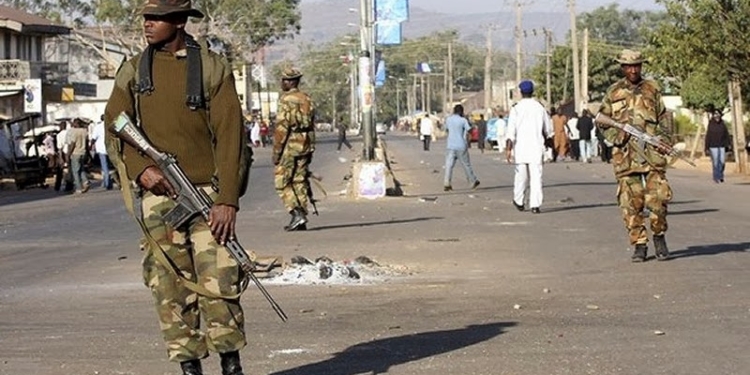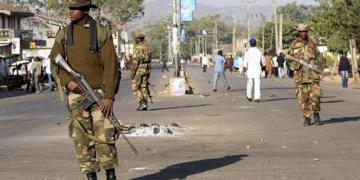In the wake of the breakout of the Coronavirus pandemic ( COVID-19) globally, the federal government of Nigeria has initiated measures towards the containment of the further spread of the virus. President Muhammdu Buhari consequently imposed a 14-day lockdown in the federal capital territory-Abuja, Lagos and Ogun states.
A section of the country hailed this move by the president and as well criticized by others citing the effect the lockdown would have on the polity. This medium consequently investigated the level of compliance in the Federal Capital Territory and environs.
In the Federal Capital Territory, it was observed that the level of compliance was over 95% with officers and soldiers of the Nigerian Army and other security agencies seen at strategic places within the federal capital territory enforcing the lockdown.
Those that were granted clearance to move were mostly those rendering essential services. This medium sampled the opinion of some persons as regards the directive of the federal government on the containment of the Coronavirus pandemic, and the responses were indeed satisfactory.
According to Mrs. Hannatu Yakzum, a nurse with one of the public hospitals in Abuja, she expressed satisfaction with the level of compliance so far, indicating one of the ways the coronavirus could be contained is when people stay indoors.
“The lockdown is necessary given the fact that the virus spreads upon contact and the World Health Organization has stated there is a need for people to maintain social distancing by staying in their homes for a certain period. The federal government has done well in this regard, even though it would be difficult to observe 100% compliance.”
“As you can see, there is a strong presence of soldiers at strategic places within the city, and they have denied access to those that do not have any business outside. This is quite commendable.”
Another respondent interviewed in the Asokoro area of the federal capital territory believed that mandating the Nigerian Army to enforce the sit-at-home order is one of the best decisions given the attitude of Nigerians to obeying instructions.
“The coronavirus is real and a global pandemic. As we all know, it takes great efforts for Nigerians to obey instructions most times. So the deployment of soldiers is appropriate, and that is why you could see this level of compliance. I am not sure the police would have achieved this much.
It was also observed that soldiers who mounted checkpoints at the City Gate were seen screening motorists in an orderly manner while maintaining social distancing. Mr. Abayomi Lawal, a security operative with Nizamiye Hospital, stated that the soldiers were conducting themselves with care with the kind of questions been asked and the level of distancing maintained.
“We are gradually getting it right in this country; you must agree with me that if this were to be in time past, you must have received some merciless beatings before questioning by the soldiers. But this time around, you could see the decorum displayed by the soldiers. Those without a genuine reason to be on the road are advised to turn back and go home.”
“The level of organization displayed by the soldiers at the city gate is responsible for the orderliness experienced here. As you can see, those cars turning back are those that were denied access by the soldiers.”
However, for Mr. Kunle Ifedayo, a welder residing along the airport road, it wasn’t a pleasant experience he had with the soldiers at the Zuba axis of the federal capital territory. He stated that the soldiers meted out stringent punishment to those they found on the roads.
“I was asked to sit on the bare floor for over an hour by the soldiers. I was on my way to Zuba to quickly buy some materials to complete a job so that I can have some money. I explained to the soldiers, but they won’t listen. They said I have flouted the presidential directive and asked me and some others to sit down on the floor. I think that was too harsh since we were going to buy work materials and not traveling.”
This was not the case for Mr. Stanly Rotimi, a building contractor who was forced to push his car backward for one kilometer for flouting the sit at home directive. According to him, he was on his way to one of his building sites in the Lokongoma axis of Abuja when some soldiers stopped him.
“I was asked of my mission, and I informed them that I was on my way to the site. They asked if I was going to work alone and I informed the soldiers that my workers were already waiting for me at the site. They told me I had no businesses gathering people at this period and was asked to push my car backwards for close to one kilometer. I almost died until an officer beckoned on me to stop and offered me water to drink.”
“In truth, I didn’t know my action violated the government sit at home order, even though I think the approach of the soldiers was very harsh. I could have died in the process of pushing my vehicle all by myself. I am appealing to the relevant authorities to caution the soldiers as it is not everyone on the road that is healthy.”
Our reporters also observed that within the federal capital city that consists of Wuse, Maitama, and Garki, a strong military presence was noticeable at strategic places. It was noted that the soldiers accosted those on the road, and those with the genuineness of reasons to be out were granted passage and while those without any cogent reason were asked to return home.
For Ms. Ada Onyeakachi, a telecoms worker, it was reassuring to see the way and manner the Nigerian Army exhibited decorum in their conduct. She believed that, indeed, things have changed in the operations of the Nigerian Army.
“It was hard to believe I was in Nigeria with the way and manner I was approached by soldiers on my way to work. The decorum was impressive and they as well maintained social distancing with face masks on. I think Nigeria is making progress.”
When our reporters visited the Karu axis of the FCT, it was observed that soldiers mounted checkpoints and ensured that those with legitimate business outside were granted permission into the FCT. Quite many vehicles were turned back.
Some of those our reporters interacted with expressed satisfaction with the conduct of the soldiers. They stated that there were no displays of hostilities as typical in times past. Mr. Ephraim Oguche, who was one of those denied passage, said that he was impressed with the conduct so far.
“I don’t feel bad in any way, but instead glad I was treated courteously by the soldiers. Upon interrogation, they pointedly told me I had no business outside and that I should return and stay with my family. I didn’t argue with them as I know they were only doing their job in the interest of the country.
Our reporters also gathered from credible sources that the military high command issued a directive that under no circumstance should motorists be subjected to any form of torture. Our source who pleaded anonymity stated that it would have been impossible for the soldiers to go contrary to the directive issued by the military hierarchy.
“The conduct of the military personnel on the streets was as a result of the directive issued that under no circumstances should any citizen is harassed on the street. The instruction was clear. Those on essential duties should be granted passage, and those without any genuine reason should be asked to return home.”
“I think to a large extent that has been the order of the day, except for a few cases where some soldiers would attempt to go extreme in their conduct.”
This medium also interacted with scores of people at different locations within the FCT, and the generality of the respondents expressed satisfaction with the implementation of the lockdown by the relevant security agencies.
This was against the initial apprehension expressed in some quarters with the implementation of the lockdown by the relevant security agencies. The military command has, by their action, displayed an enviable level of professionalism.






Discussion about this post